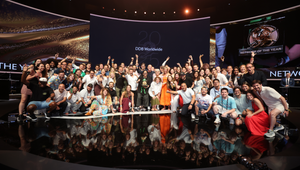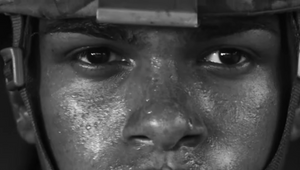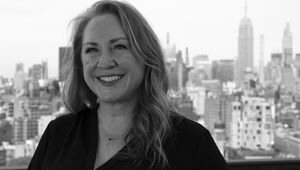
How DDB Hopes to Boost Borderless Creativity with its New Creative Chief of Staff

When Susie Walker was announced as DDB Worldwide’s new creative chief of staff, the network’s global chief creative officer Ari Weiss was inundated with envious messages from other senior advertising figures. Having worked for nine years previously at Cannes Lions, most recently as VP for awards, there may be no one else in the world more qualified to focus on an agency’s strategy for retaining and attracting talent and helping projects gain recognition within the network and at award ceremonies.
With a goal to implement insights Susie has gained from analysing data around creative performance and trends at Cannes Lions, she’s also focused on helping to cultivate the creative culture at DDB. She’ll be working closely with Ari Weiss and global chief marketing and communications officer Donna Tobin, as well as its global and regional creative councils that evaluate the work of the network throughout the year.
LBB’s Alex Reeves caught up with Ari and Susie to hear more about the role and their ambitions together.
LBB> Congratulations Ari, on making such a brilliant hire! Why does the DDB network need this change right now?
Ari> I think there's a big difference in networks between creative organisation and creative inspiration. They need to be inextricably linked.
There's so much talk always about when you're made a creative director for the first time, there's very little training. In the best case there's great mentoring that takes place and you've seen good examples from your predecessors, but there's not a formal training programme. You’ve pretty good at coming up with interesting ideas, but now can you sell them, or now can you go out to dinner with the client, have them trust you and build on this track record or how do you develop these relationships?' And I think the same goes at the highest levels of these creative organisations. How do you really develop creative culture? It's not one person; it takes a small army. You want a spiritual lighthouse of sorts to set a vision.
But how you organise and build around that vision, I think oftentimes gets short shrift. Susie's incredibly organised mind but also experience working in an organisation that's all about data and creativity was really appealing to how we develop an even stronger creative culture in the network that debatably started creative cultures in modern advertising.
But I think putting Susie to task and organising more regional centres of creative excellence around the world will help us become more organised, help us really share our best expertise with offices that might not be fully there yet. That's the big global job.
LBB> Susie is creative chief of staff for DDB Worldwide. What is that?
Ari> Nobody knows. It's as any chief of staff, which is ultimately the brains behind the operation.
I'm quite good with the spiritual part. And I love the work, I love the doing and I love leading by example. But there's only so many hours in the day. So we need to build teams and strategies, we need to test those strategies and then we need to implement those strategies and then we need to optimise those strategies.
Creativity is a full-time job. To have to have a brain like Susie join us with nine years of experience of calculating it on the other side, it does feel like a cheat. I've got a lot of notes. I think my favourite was probably from Suzanne Powers at McCann, who I love dearly - she's their global chief strategy officer. She said 'nice one, but it does feel a bit like you're cheating'. But it's not cheating if you're playing by the rules. We just found a good person who was willing to join us.
LBB> I guess also you’re not hiring Susie just to win more Lions.
Ari> No. In fact, it's actually to be measured and acknowledged on the effective work. One of the things we've been talking a lot about is the confluence between Cannes and Effies – the cases that are showing up in both. There used to be a time where you would sit in a Cannes jury and there was a really great idea. And here's 20 middle aged CCOs, who have been around and they kind of knock the table and stamp it with their creative blessing. But in the last five to 10 years, so much of that has shifted to what is really driving business results. And in a weird way the subjective, 'we're blessing this as creatively excellent' has kind of diminished. There's still debate around that, but the big winners – the things that are really leading the industry forward – I think, are actually quite objective.
Susie's expertise is on efficacy, really. I think it just gets overshadowed sometimes by shiny Lions.
LBB> Susie, what are you most excited about getting stuck into?
Susie> It's a really exciting brief, which is why I decided to take the role. Ari's great, and is really clear about his passion and his ambition for the network.
I'm working across talent, the culture and the creative function as well and then excellence, which is if we're doing a great job then let's make sure that we're being recognised for that and we're not leaving stuff on the table.
But really, it's about the talent and the culture at DDB which will lead to that. Working with Ari on the strategy and how we're going to get there.
And then leading the agenda for the global creative council, where all the creative leadership across DDB come together. We have regions as well that meet regularly to look at the work but also, work out how we inspire creative teams around the world, some of whom might feel a bit out of the loop. How do we spread that attention and focus and culture more evenly across the network?
I love work. I also love people. And data. So this is a great job for me. Part of my role at Lions was heading up all of their research and content coming out of the data there. That kind of insight, I think, is going to be really useful in looking at what is happening at the network, what has happened and potentially what we can do to bring people together and galvanise people. I'm very excited.
LBB> You've had a really unique career so far. How do you feel that your career has equipped you for this role at DDB?
Susie> I worked at Lions for nine and a half years. You get a golden notebook if you last 10 years and I just missed out on it. But before that I trained in theatre and cultural theory and worked at some of the UK's biggest cultural institutions Shakespeare's Globe, the British Film Institute, the University of the Arts London – all of which are nonprofit, not corporate, but culture producing organisations. And I wanted to pay my mortgage so I moved to the Lions - also really, very niche, unusual company as well. I was kind of opened up to a new world of being in the room with the best creative minds in the world, listening to them tear apart work, love work and analyse it.
Coming back over to the culture-producing side of things was really one of the most exciting things for me, to take the skills and experience that I have at Lions because it's an institution in the industry and just having that kind of viewpoint, which I think is very unique. To work with people like Ari who are massively creative and passionate and who are producing stuff that shifts culture and changes brands, changes lives – I feel like it's a good role for me to merge those two things back together.
LBB> What are the big questions that DDB needs to tackle around talent?
Ari> Everyone knows it, but I don't think it gets said quite often enough – the networks that are performing really well are using their best minds really intelligently around the world. Especially the bigger networks. The identification of talent, the elevation of talent, the development, how we share our diverse ways of looking at the world. That's a critical piece to this.
Just prior to Susie joining we had expanded the GCC which is our global creative counsel to a larger group of around 30 that had 50/50 gender parity.We also brought in much younger, less experienced voices to the table because honestly, they were just fresher. And they were a little bit less kind of burdened than some of the folks that had just been in the industry for so long. You want all the tensions. You want it to be a safe place to challenge thinking. That is ultimately what creative businesses are all about – are there enough push-pulls, are there enough tensions that are being solved from enough different perspectives? That's how we land on all the best creative thinking. So, a big part of what Susie is going to do with talent is: How do we identify the rising stars within the network? How do we identify them outside of the network and bring them into the network? How do we develop voices? And how do we work a little bit more as a network than just as a federation of traditional offices?
LBB> Is that borderless mentality a big part of the vision moving forward?
Ari> I think in a lot of ways covid was the big unlock to that because everybody was working remotely. So all of a sudden it wasn't terribly unusual to be having a three-hour conference call with London. When years past the only way that we thought we could actually do this with any efficacy was to get on an aeroplane and go visit. Which actually limited the engagements. Not to say that in person isn't still extremely valuable. But there's also plenty of times where you can get enough value. So how do we bring that group together and have best minds solving client problems that aren't necessarily sitting in necessarily that creative's backyard, for instance? We're doing more and more of that. Some of it is by design, and some of it was just accidental. You start to see these accidental things and you think maybe we should put some design to this because it's really working.
We had a Twix case this year, we had a Coors case this year, we had a Skittles case this year that were developed with creatives from two or three offices around the world. Which creates its own kind of crediting nightmares and stuff like that, but that's a problem we're very happy to have. Because you get different perspectives from how a Swede might attack a problem versus how someone in Sao Paulo might attack a problem versus how someone in Chicago might solve the problem. We're constantly learning and trying to figure out how to evolve our process to optimise these learnings.
The amount of global pitches we've been called into in recent years, the amount of people who want thought leadership from three plus regions has been growing and growing. And I think this borderless creativity is the great advantage of the large networks now. I think we're starting to see them leverage it.
The reason it doesn't work in most networks, I would say, is because there isn't really trust. That tends to be too much ego, usually at the centre somewhere. And I think one of the things we've been lucky enough to have in our group is, it's a relatively egoless business. Everybody's quite keen to chip in. Rick [Brim], for instance, who sits in London has 800 Grands Prix or something in his arsenal, but he's the first one to chip in on a small project if there's an opportunity and his teams are available. We're starting to see that kind of stuff where it's not about who's is what and what is who's; it's about what we can accomplish together. That's where everyone's finding a new satisfaction because all of a sudden, you have access to puzzles that you wouldn't necessarily have had access to. And I think most creative people like new puzzles.
LBB> A year or two down the line, what do you hope will have changed about DDB as a result of you coming and exerting your influence?
Susie> I'm an organiser and I can see patterns in things. The stuff that Ari's talking about is happening just by itself at the moment. What I would really like to see is not to pin people down but to free people a bit and have a bit more structure. Has someone in China got a really exciting brief? Have we got a mechanism to open that up to allow people to chip in the way that Ari's described?
At Lions I launched a lot of the new Lions there and I built a big team, I built a lot of products. I can work on culture change and innovation and that kind of thing. And I guess applying those skills to DDB, it's about being organised, about planning, having visibility across the network that maybe isn't quite there at the moment. And being deliberate and purposeful about how we work with our clients as well and bring them along.
It's a chief of staff role. So I think it will take us a couple of years to really get the culture going. DDB had a brilliant year at Cannes, getting to number three. They've also absolutely stormed the year with two Black Pencils and Network of the Year at Effies.
I've never met anybody who worked at DDB that I didn't like. They're really passionate about the work and about creativity and they're not a group of people who would sit back. The conversation is on how we can improve. How can we do better for our teams and for all our clients and how can we get there together? And working really closely with Ari on how we can achieve that, who knows what will happen?















